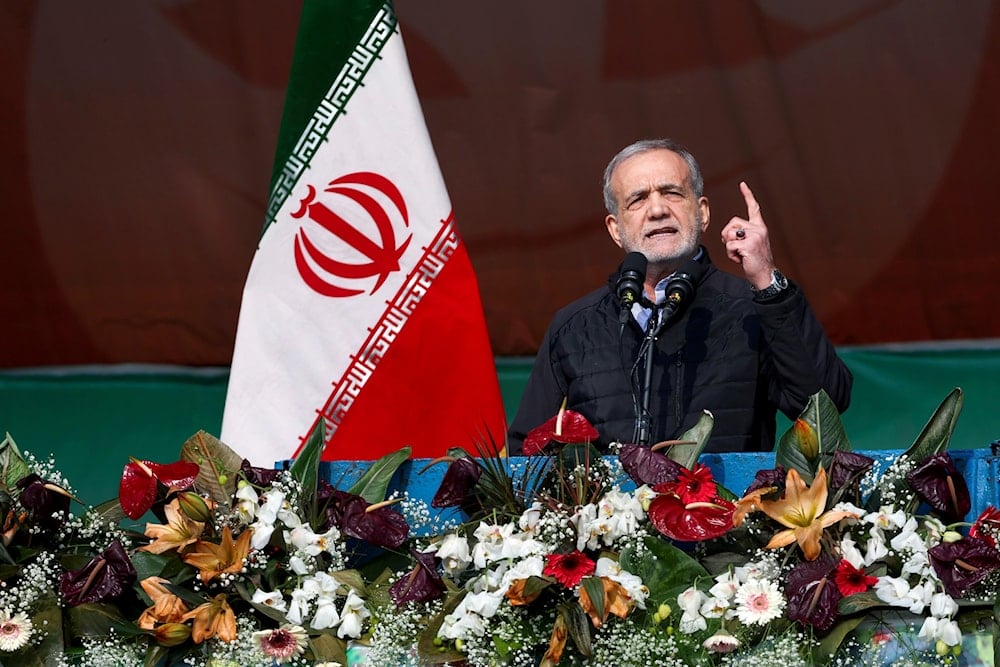Iran will negotiate but not at any cost: Pezeshkian
President Masoud Pezeshkian stated that Iran is willing to engage in dialogue, but not "at any cost."
-

In this photo released by the Iranian Presidency Office, President Masoud Pezeshkian speaks during a rally commemorating the anniversary of the 1979 Islamic Revolution in Tehran, Iran, on February 10, 2025. (Iranian Presidency Office)
Iranian President Masoud Pezeshkian stated that Iran has consistently expressed its desire for dialogue but emphasized that it will not engage in negotiations "at any cost."
During a meeting with the intellectuals of Tehran Province on Thursday, he said, "It is not acceptable to impose sanctions and say that you should have no missiles or weapons, and then talk about negotiations again."
He also mentioned that negotiations must be conducted with dignity and reiterated Iran's refusal to tolerate bullying or make concessions in return for talks. "If they come with dignity, we will negotiate, but we will not yield to coercion ... from the beginning, we have declared that we seek dialogue and negotiation, but not at any cost," he said.
Read next: Trump calls for new Iran nuclear deal, Tehran responds with caution
The comments come as US President Donald Trump, who withdrew from a multi-party, UN-backed nuclear agreement with Iran and other nations in 2018, has expressed interest in engaging in talks with Iran while simultaneously resuming his so-called "maximum pressure" campaign against Tehran.
Referring to his American counterpart, Pezeshkian said, "He thinks that if he comes and threatens us, we will back down tomorrow and say, 'Alright, we accept whatever you say.' We are human beings with dignity. If they come with dignity, we will have a dialogue, but we are not going to yield to coercion."
On February 4, Trump signed a National Security Presidential Memorandum reinstating his "maximum pressure" policy toward Iran, a strategy he first introduced during his initial term in office. The decision was made two days after Trump expressed his willingness to reopen negotiations with Iran.
US, Europe supported 'Israel’s' ‘brutality’
In other parts of his remarks, Pezeshkian highlighted the Israeli occupation's actions in Gaza and Lebanon, stating, "No awakened conscience will accept the moves taken by the criminal Israel against the defenseless people in Gaza, Lebanon, and Palestine."
He also stated that the United States and Europe not only supported the Israeli occupation's "brutality" but also provided it with bombs and weapons.
Pezeshkian pointed out that "If one billion Muslims in the region were united as brothers, the genocidal Zionist regime, with a population of two million, would not be able to create such a situation for Muslims."
He condemned efforts to stir ethnic and religious divisions among regional nations, stating that no country holds the Israeli occupation accountable for its crimes because of US support. He also stressed that Iran would never fear the US or "Israel", expressing confidence in the country's ability to resolve its issues.
Iran accuses IAEA Chief Grossi of political bias
On a similar note, the Iranian Atomic Energy Organization has strongly criticized Rafael Grossi, the Director General of the International Atomic Energy Agency (IAEA), for his recent statements on Iran's nuclear program, accusing him of political bias and unprofessionalism. Iran urged Grossi to maintain impartiality and professionalism, stressing that his role requires neutrality and technical objectivity.
In a statement, the Iranian Atomic Energy Organization expressed concern that Grossi's comments showed clear political inclinations, warning that his departure from impartiality could tarnish the IAEA's credibility. The organization noted that the United States and Western countries could exploit Grossi's statements as pretexts to justify continued pressure and sanctions on Iran.
"In a situation where the United States and some Western countries are seeking to misuse the IAEA for their unfair pressure against Iran, these political and unprofessional statements could become a pretext for their illegitimate interests," the statement read.
The criticism came after Grossi's remarks during a press conference in Tokyo, where he claimed that Iran needed to prove it was not pursuing nuclear weapons, despite Iran's consistent and transparent assurances that its nuclear program is strictly for peaceful purposes. Iran has repeatedly affirmed its commitment to the Non-Proliferation Treaty and international regulations, highlighting its peaceful nuclear intentions.

 4 Min Read
4 Min Read








